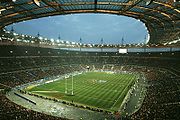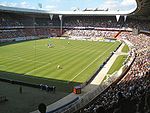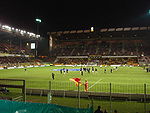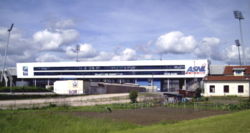
UEFA Euro 2016
Encyclopedia
The 2016 UEFA European Football Championship, commonly referred to as Euro 2016, will be the 15th European Championship
for national football teams sanctioned by UEFA
. It will be held in the summer of 2016. The host nation was announced to be France on 28 May 2010. The tournament will be expanded from 16 to 24 teams in 2016 after the plan was unanimously agreed by senior officials of all 53 UEFA member nations.
The winner of the tournament will earn the right to compete for the 2017 FIFA Confederations Cup
hosted by Russia.
The host was selected on 28 May 2010:
's term Euro 2008 was awarded to Switzerland, during your term Euro 2016 is awarded to France, is this the new trend?" Michel Platini
said "When there is a Turkish president, then you can host a major tournament".
Guus Hiddink
was also highly critical of the decision, stating: "This proves once again that in top-flight football the game is run by politics", and "UEFA gave the Euro 2016 finals to France, who have already had the tournament twice and they also had the World Cup finals in 1998. This does not feel right. I get the feeling that the actual bid was about other things. Otherwise the choice for France as hosting nation, the country of UEFA president Platini, cannot be explained."
Another highly controversial remark came from the French national player Marc Planus
:
"We learned that last night (Thursday night). We're really excited, it will boost the French football."
The bidding and the decision process took place on Friday, one day after the day French player suggested that "they have already known".
Before the bidding process, Platini introduced the French president Nicolas Sarkozy
to every member of the decision committee in person, while he did not do the same for the Turkish president Abdullah Gul
. After the decision Platini concluded: "I'm happy because France has won, and I'm French — let's not forget it."
from 1986
to 1994
. This format would generate a total of 51 games, compared with 31 now, to be played over a period of 29-31 days.
Nine groups are expected to be formed in the qualifying draw including seven sections of six sides and two of five, as 52 teams chase 23 finals places alongside host France. The seeding pots are expected to be formed on the basis of the UEFA national team coefficient ranking system, finalised after the completion of FIFA World Cup qualifying, with the reigning European champions automatically top seeded. All groups will contain one nation from the first five pots and seven sections will also include a team from Pot 6.
At the conclusion of qualifying, the team at the top of each group and the runners up will qualify automatically. The third placed team with the highest points total will also qualify automatically. The remaining teams placing third in their respective groups will contest two-legged play-offs, with the winner of each play-off tie qualifying for the finals.
UEFA still has to confirm this qualifying format.
The French Federation had to pick up which nine stadia would actually be used. The choice for the seven first was undisputed - Stade de France
, four newly constructed stadia in Lille, Lyon, Nice and Bordeaux, and those of the biggest cities, Paris and Marseille. The last two remaining places, after Strasbourg opted out for financial reasons, were chosen to be Lens and Nancy in the first round of voting, instead of Saint-Étienne and Toulouse, chosen as reserve stadia, who vainly protested. In June 2011, the number of host venues was increased to eleven because of the new tournament format which sees 24 teams taking part, instead of just 16. The decision means that the reserve cities of Toulouse and St Etienne joined the list of full-fledged hosts.12 candidates were selected stadiums for Euro 2016. There are no more than 11 as of July 29, 2010 due to the withdrawal of Strasbourg. The club went down in the National after the 2010 season, the mayor has decreed that the city did not have sufficient funds to renovate the Stadium of Meinau.
UEFA European Football Championship
The UEFA European Football Championship is the main football competition of the men's national football teams governed by UEFA . Held every four years since 1960, in the even-numbered year between World Cup tournaments, it was originally called the UEFA European Nations Cup, changing to the current...
for national football teams sanctioned by UEFA
UEFA
The Union of European Football Associations , almost always referred to by its acronym UEFA is the administrative and controlling body for European association football, futsal and beach soccer....
. It will be held in the summer of 2016. The host nation was announced to be France on 28 May 2010. The tournament will be expanded from 16 to 24 teams in 2016 after the plan was unanimously agreed by senior officials of all 53 UEFA member nations.
The winner of the tournament will earn the right to compete for the 2017 FIFA Confederations Cup
2017 FIFA Confederations Cup
The 2017 FIFA Confederations Cup is expected to be held in June 2017, as a prelude to the 2018 FIFA World Cup. The host will be Russia as announced on 2 December 2010.- Qualified Teams :...
hosted by Russia.
Bidding process
Four bids came before the deadline at 9 March 2009, which were France, Italy and Turkey as single bids and Norway and Sweden as a joint bid. Norway and Sweden eventually withdrew their bid in December 2009.The host was selected on 28 May 2010:
Final round
| Voting Results | |
|---|---|
| Country | Votes |
| 7 | |
| 6 | |
Decision controversy
There was controversy concerning the decision to give the Euro 2016 to France and not to Turkey. After the decision was announced, responding to the question "During Sepp BlatterSepp Blatter
Joseph S. Blatter , commonly known as Sepp Blatter, is a Swiss football administrator, who serves as the 8th and current President of FIFA . He was elected on 8 June 1998, succeeding João Havelange. He was re-elected as President in 2002, 2007, and 2011...
's term Euro 2008 was awarded to Switzerland, during your term Euro 2016 is awarded to France, is this the new trend?" Michel Platini
Michel Platini
Michel François Platini is a former French football player, manager and current president of UEFA. Platini was a member of the French national team that won the 1984 European Championship, a tournament in which he was the top goalscorer and voted the best player. He participated in the 1978, 1982...
said "When there is a Turkish president, then you can host a major tournament".
Guus Hiddink
Guus Hiddink
Guus Hiddink is a Dutch football manager and former player. He was the most recently manager of the Turkish national football team. He is considered to be one of the best managers of his generation and was the best-paid coach in international football in 2009...
was also highly critical of the decision, stating: "This proves once again that in top-flight football the game is run by politics", and "UEFA gave the Euro 2016 finals to France, who have already had the tournament twice and they also had the World Cup finals in 1998. This does not feel right. I get the feeling that the actual bid was about other things. Otherwise the choice for France as hosting nation, the country of UEFA president Platini, cannot be explained."
Another highly controversial remark came from the French national player Marc Planus
Marc Planus
Marc Planus is a French football defender, currently playing for Bordeaux. He plays as a central defender and currently the longest serving player for Bordeaux since 2002.-Bordeaux:...
:
"We learned that last night (Thursday night). We're really excited, it will boost the French football."
The bidding and the decision process took place on Friday, one day after the day French player suggested that "they have already known".
Before the bidding process, Platini introduced the French president Nicolas Sarkozy
Nicolas Sarkozy
Nicolas Sarkozy is the 23rd and current President of the French Republic and ex officio Co-Prince of Andorra. He assumed the office on 16 May 2007 after defeating the Socialist Party candidate Ségolène Royal 10 days earlier....
to every member of the decision committee in person, while he did not do the same for the Turkish president Abdullah Gul
Abdullah Gül
Dr. Abdullah Gül, GCB is the 11th and current President of the Republic of Turkey, serving in that office since 28 August 2007. He previously served for four months as Prime Minister from 2002-03, and as Minister of Foreign Affairs from 2003-07....
. After the decision Platini concluded: "I'm happy because France has won, and I'm French — let's not forget it."
Expanded format
The format of the final tournament will consist of six groups of four teams, followed by a round of 16, quarter-finals, semi-finals and final. The top two from each group would qualify in addition to the four best third-ranked sides, the same system as was applied in the World CupsFIFA World Cup
The FIFA World Cup, often simply the World Cup, is an international association football competition contested by the senior men's national teams of the members of Fédération Internationale de Football Association , the sport's global governing body...
from 1986
1986 FIFA World Cup
The 1986 FIFA World Cup, the 13th FIFA World Cup, was held in Mexico from 31 May to 29 June. The tournament was the second to feature a 24-team format. Colombia had been originally chosen to host the competition by FIFA but, largely due to economic reasons, was not able to do so and officially...
to 1994
1994 FIFA World Cup
The 1994 FIFA World Cup, the 15th staging of the FIFA World Cup, was held in nine cities across the United States from June 17 to July 17, 1994. The United States was chosen as the host by FIFA on July 4, 1988...
. This format would generate a total of 51 games, compared with 31 now, to be played over a period of 29-31 days.
Qualification
With the expansion to 24 teams, middle-ranked countries have a much greater chance to qualify for the finals than earlier. The traditional qualifying structure, with groups of six and five teams, will remain in place.Nine groups are expected to be formed in the qualifying draw including seven sections of six sides and two of five, as 52 teams chase 23 finals places alongside host France. The seeding pots are expected to be formed on the basis of the UEFA national team coefficient ranking system, finalised after the completion of FIFA World Cup qualifying, with the reigning European champions automatically top seeded. All groups will contain one nation from the first five pots and seven sections will also include a team from Pot 6.
At the conclusion of qualifying, the team at the top of each group and the runners up will qualify automatically. The third placed team with the highest points total will also qualify automatically. The remaining teams placing third in their respective groups will contest two-legged play-offs, with the winner of each play-off tie qualifying for the finals.
UEFA still has to confirm this qualifying format.
Qualified teams
| Country | |Qualified as | |Date qualification was secured | |Previous appearances in tournament |
|---|---|---|---|
| (8) 19602, 19841 2, 1992, 1996, 20001, 2004, 2008, 2012 | |||
Venues
Twelve stadia were presented for the bid, of which eleven will be used during the tournament:| Saint-Denis Saint-Denis Saint-Denis is a commune in the northern suburbs of Paris, France. It is located from the centre of Paris. Saint-Denis is a sous-préfecture of the Seine-Saint-Denis département, being the seat of the Arrondissement of Saint-Denis.... |
Marseille Marseille Marseille , known in antiquity as Massalia , is the second largest city in France, after Paris, with a population of 852,395 within its administrative limits on a land area of . The urban area of Marseille extends beyond the city limits with a population of over 1,420,000 on an area of... |
Lyon Lyon Lyon , is a city in east-central France in the Rhône-Alpes region, situated between Paris and Marseille. Lyon is located at from Paris, from Marseille, from Geneva, from Turin, and from Barcelona. The residents of the city are called Lyonnais.... |
|---|---|---|
| Stade de France Stade de France The Stade de France is the national stadium of France, situated just north of Paris in the commune of Saint-Denis. It has an all-seater capacity of 80,000, making it the fifth largest stadium in Europe, and is used by both the France national football team and French rugby union team for... |
Stade Vélodrome Stade Vélodrome The Stade Vélodrome is a football stadium in Marseille, France. It is home to the Olympique de Marseille football club of Ligue 1, and was a venue in the 1998 FIFA World Cup and the 2007 Rugby World Cup. It is the largest club-football ground in France, with a capacity of 60,031 spectators,... |
Stade des Lumières New Olympique Lyonnais Stadium New Olympique Lyonnais Stadium is 61,556-seat stadium that the French football club Olympique Lyonnais is building near Décines. It will replace its current stadium, Stade Gerland... |
| 48°55′28"N 2°21′36"E | 43°16′11"N 5°23′45"E | 45.766912°N 4.980991°E |
| Capacity: 81,338 | Capacity: 67,000 | Capacity: 61,556 |
 |
||
| Paris Paris Paris is the capital and largest city in France, situated on the river Seine, in northern France, at the heart of the Île-de-France region... |
Villeneuve d'Ascq Villeneuve d'Ascq Villeneuve-d'Ascq is a commune in the Nord department in northern France. With more than 60,000 inhabitants, it is one of the main cities of the Urban Community of Lille Métropole and the largest in area after Lille ; it is also one of the main cities of the Nord-Pas de Calais region.Built up... (Lille Lille Lille is a city in northern France . It is the principal city of the Lille Métropole, the fourth-largest metropolitan area in the country behind those of Paris, Lyon and Marseille. Lille is situated on the Deûle River, near France's border with Belgium... ) |
|
| Parc des Princes Parc des Princes The Parc des Princes is an all-seater football stadium located in the southwest of Paris, France. The venue, with a seating capacity of 48,712 spectators, has been the home of French football club Paris Saint-Germain since 1974. The current Parc des Princes was inaugurated on 4 June 1972, endowed... |
Grand Stade Lille Métropole | |
| 48°50′29"N 2°15′11"E | 50.611275°N 3.128196°E | |
| Capacity: 51,000 | Capacity: 50,186 | |
 |
||
| Lens Lens, Pas-de-Calais Lens is a commune in the Pas-de-Calais department in northern France. It is one of France's large Picarde cities along with Lille, Valenciennes, Amiens, Roubaix, Tourcoing, Arras, and Douai.-Metropolitan area:... |
Bordeaux Bordeaux Bordeaux is a port city on the Garonne River in the Gironde department in southwestern France.The Bordeaux-Arcachon-Libourne metropolitan area, has a population of 1,010,000 and constitutes the sixth-largest urban area in France. It is the capital of the Aquitaine region, as well as the prefecture... |
|
| Stade Félix-Bollaert | New Bordeaux stadium New Bordeaux stadium New Bordeaux stadium is a description of a stadium in Bordeaux, France that is in the planning stages. It is due to begin construction in 2013 and will have a capacity of 43,000 spectators. It will be the new home of FC Girondins de Bordeaux of Ligue 1. It will also be used to host some matches... |
|
| 50°25′58.26"N 2°48′53.47"E | 44.8291°N 0.597778°W | |
| Capacity: 45,000 | Capacity: 42,566 | |
 |
||
| Nancy | Nice Nice Nice is the fifth most populous city in France, after Paris, Marseille, Lyon and Toulouse, with a population of 348,721 within its administrative limits on a land area of . The urban area of Nice extends beyond the administrative city limits with a population of more than 955,000 on an area of... |
|
| Stade Marcel Picot Stade Marcel Picot Stade Marcel Picot is a football stadium located in Tomblaine, France, near the city of Nancy. Built in 1926, it is used by Ligue 1 soccer team AS Nancy.The stadium was completely rebuilt and inaugurated in its new configuration in 2003... |
Grand Stade Nice Grand Stade Nice The Olympic Nice Stadium is a multi-use stadium project in Nice, France, to be used mostly for football matches of host OGC Nice. The stadium will have a capacity of 35,000 people and replaces their current stadium Stade Municipal du Ray. Construction started in 2011 and will be completed in... |
|
| 48.6955°N 6.210687°W | 43°42′25"N 7°11′40"E | |
| Capacity: 35,000 | Capacity: 35,000 | |
 |
The French Federation had to pick up which nine stadia would actually be used. The choice for the seven first was undisputed - Stade de France
Stade de France
The Stade de France is the national stadium of France, situated just north of Paris in the commune of Saint-Denis. It has an all-seater capacity of 80,000, making it the fifth largest stadium in Europe, and is used by both the France national football team and French rugby union team for...
, four newly constructed stadia in Lille, Lyon, Nice and Bordeaux, and those of the biggest cities, Paris and Marseille. The last two remaining places, after Strasbourg opted out for financial reasons, were chosen to be Lens and Nancy in the first round of voting, instead of Saint-Étienne and Toulouse, chosen as reserve stadia, who vainly protested. In June 2011, the number of host venues was increased to eleven because of the new tournament format which sees 24 teams taking part, instead of just 16. The decision means that the reserve cities of Toulouse and St Etienne joined the list of full-fledged hosts.12 candidates were selected stadiums for Euro 2016. There are no more than 11 as of July 29, 2010 due to the withdrawal of Strasbourg. The club went down in the National after the 2010 season, the mayor has decreed that the city did not have sufficient funds to renovate the Stadium of Meinau.

